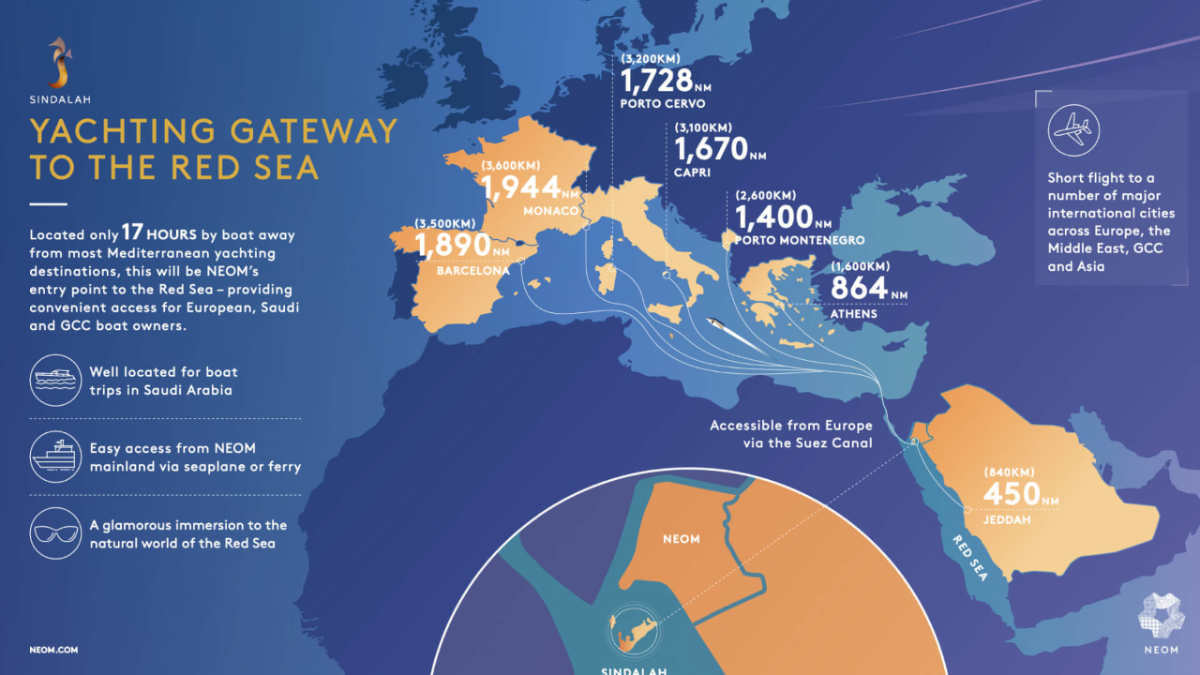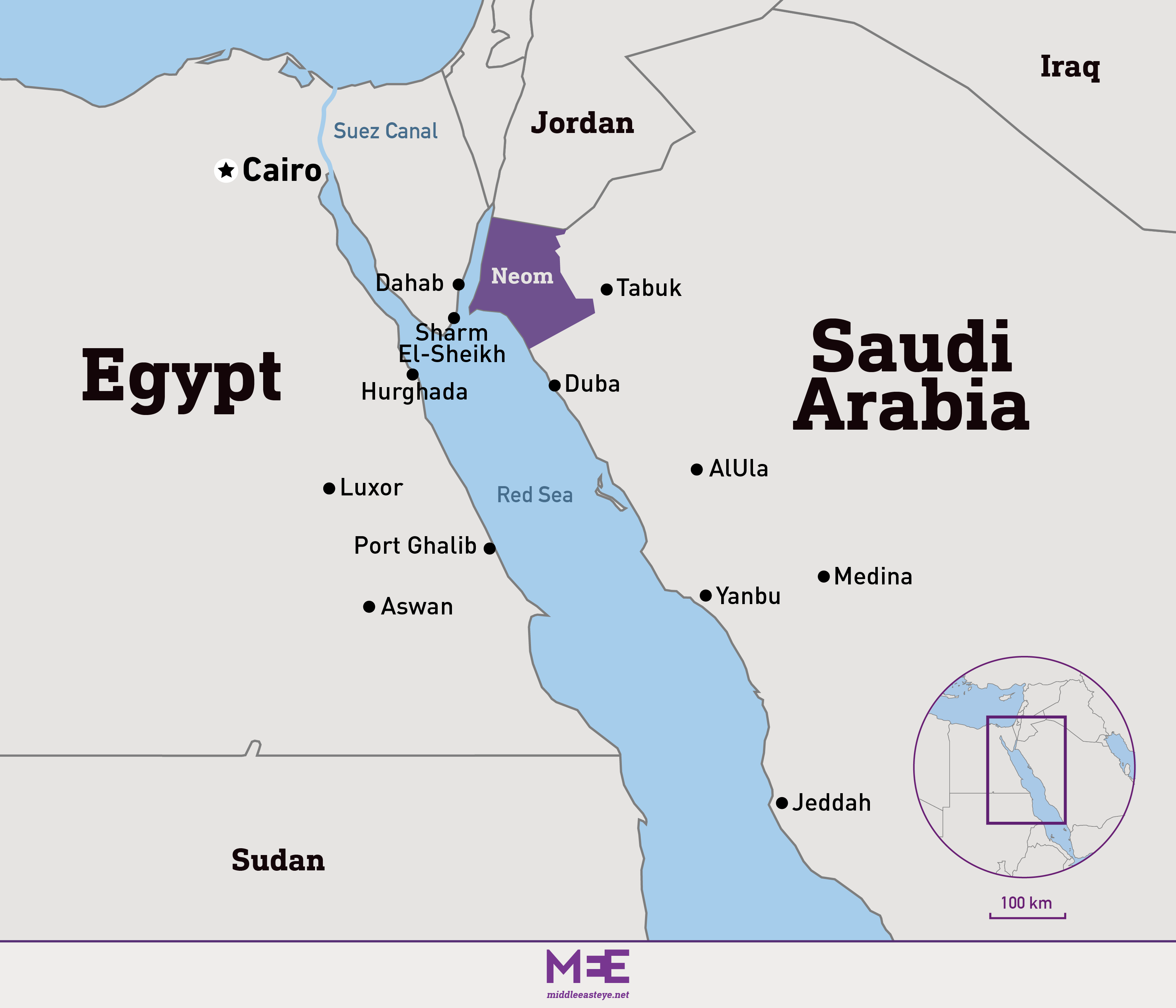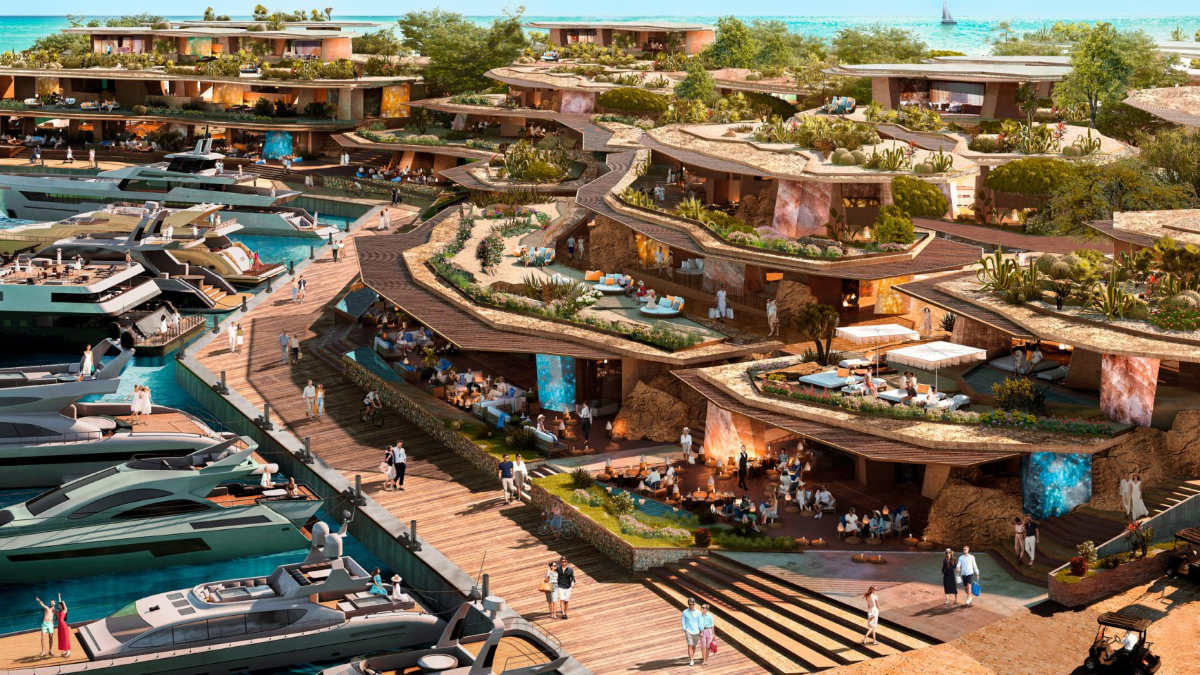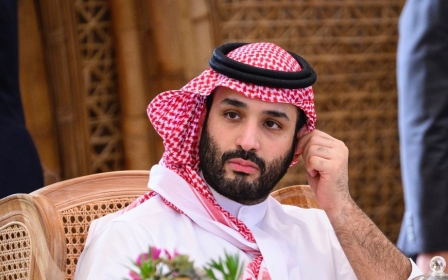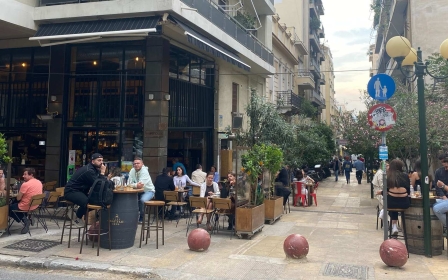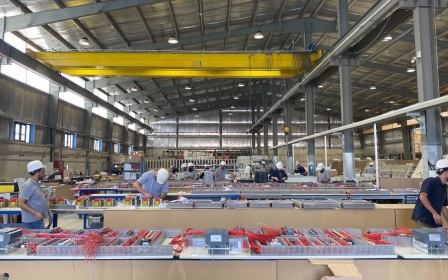Mega-yachts versus sailboats: Saudi Arabia's quest to conquer Red Sea tourism
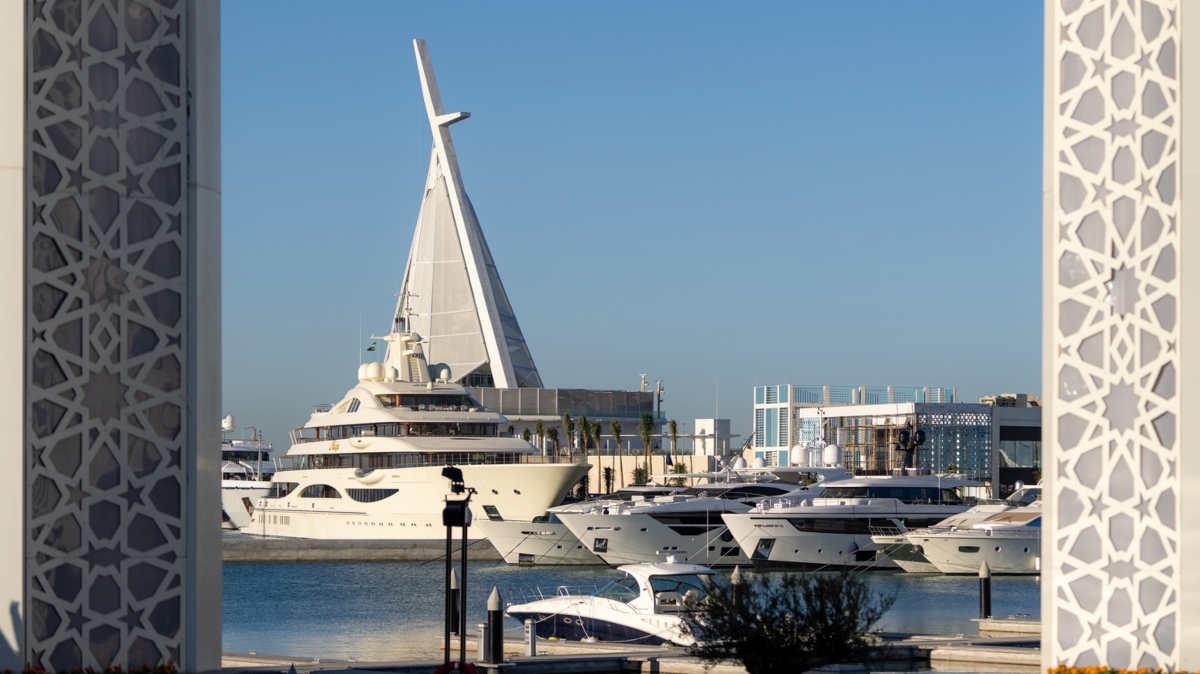
First, the mega-yachts came to Saudi Arabia.
It was 2021, and a discreet message had been sent out to the sailing world's most exclusive club: the coast of a yet-to-be-constructed, futuristic $500bn mega-city on the Red Sea was open for a sneak peek.
"More than 10 mega-yachts a day were going through the Suez Canal, all coming from the Mediterranean to Neom," Ehab Soukar, owner of sailing agency Prince of the Red Sea in Port Suez, Egypt, told Middle East Eye. "I arranged transit for Brits, Swedes and Americans."
Since then, Saudi Arabia has broadened efforts to promote its 2,000km coastline for leisure travel. In October, the Jeddah Yacht Club began offering cut-rate prices to sailing YouTubers willing to stop at its new state-of-the-art marina, sources told MEE.
The invite enticed Keith Whitaker, who was in the Red Sea documenting his family's sailing adventures to his 550,000 subscribers on his channel Sailing Zatara. "Saudi Arabia has the potential to be a great cruising ground," Whitaker told MEE.
New MEE newsletter: Jerusalem Dispatch
Sign up to get the latest insights and analysis on Israel-Palestine, alongside Turkey Unpacked and other MEE newsletters
Ken Powers, who has the channel Sailing Aquarius Around The World, followed. "Saudi Arabia really wants people to come to the Red Sea. They will support anybody with a YouTube channel."
The campaign is paying off.
Watching Whitaker's Youtube videos convinced Frank Weiand to visit. He spoke to MEE from the Greek island of Crete, the final leg on his journey to the oil-rich kingdom. Of course, Saudi Arabia's sailing industry is so nascent that the Jeddah Yacht Club and marina appears in the middle of the Red Sea on Weiand's new GPS system.
"They have some kinks to work out," he told MEE.
'Saudi Arabia wants mega-yachters'
Crown Prince Mohammed Bin Salman is leveraging oil revenue to diversify his kingdom's economy with investments in tourism and entertainment. Saudi Arabia recruited football star Cristiano Ronaldo and this month a Saudi-backed Golf league cut a deal with the PGA. But the Red Sea lies at the epicentre of Saudi Arabia's ambitions.
While mega-projects like the 170km Line city are years away from completion, and still dogged by scepticism, yachting is underway.
Western sailors are coming away with a taste of the kingdom's culture and traditional hospitality, but they are also coping with high prices, pesky princes and a security state.
'All the best places to cruise... the royal family has built private installations on them'
- Keith Whitaker, veteran sailor
Veteran Australian sailor Wayne Sillick checked into the Jeddah Yacht Club this spring. He told MEE he paid an "outstandingly high" price of $2,100 for entry and exit to the marina, along with visas and permits.
Agent fees to coordinate check-in and arrange for fuel and supplies ran about 500 percent higher than anywhere else he has paid while circumnavigating the globe.
MEE reviewed one bill from a Saudi agent posted in the private Facebook group 'Red Sea Passage' for $4,945 that included entry and exit visas for four people. Members of the group expressed shock at the price. Since Saudi Arabia opened for tourists in 2019, visas are available online for $123 per person.
"The Saudis want mega-yachters with money, they aren't geared to servicing middle class yachties," said Sillick.
The Saudi port city of Jeddah, where an upgraded marina was unveiled in 2021 to host yachts for the Formula 1 Grande Prix, is the kingdom's main sailing hub, but the centre of gravity will shift north when the Red Sea Island Project and Neom open. Prices there are expected to be even higher with a luxury marina company set to take over management.
The seaside resort of Sindalah, which will have an 86 berth marina, is slated to be the first Neom project to open. Its website advertises proximity to pricey European yachting spots like Capri, Monaco and Porto Montenegro. It's being billed as a natural winter stopover from the Mediterranean.
"High net worth and ultra-high net worth individuals and young people with the potential for future wealth generation" is the western demographic Saudi Arabia is targeting, Robert Mogielnicki, a senior resident fellow with the Arab Gulf States Institute, told MEE.
But thousands of dollars buys a lot less sailing around Saudi Arabia than it does in Mediterranean destinations like Greece, Italy or Turkey where boats are free to drop anchor as they please, and cruising fees run a couple hundred euros a month on average.
'MBS cracks the whip'
Despite a push to lure sailors, the pastime remains bureaucratic and tightly regulated. Sailors have to submit the spots where they want to drop anchor on a portal called Ebhar for pre-approval by Saudi authorities. Boats are also required to check in and out of the country from the same port of origin, making it difficult to bounce around.
"You can't just find a nice hidden beach and swim. The Saudis don't understand how much freedom western sailors want," Sillick added.
"Every single little place where you can seek shelter has a coastguard stationed there, and bloody hell, the equipment those guys have," Per Kjellqvist, a sailor based on the Greek island of Rhodes told MEE, describing his trip.
"By nature, sailors want to explore things. We are the Saudi coastguard's worst nightmare," added Sillick
Much of Saudi Arabia's coastline is sealed off because of ongoing construction on mega-projects, but that's not the whole story.
"All the best places to cruise from a yachting perspective, the royal family has built private installations on them and you aren't allowed to go 20 miles (32km) near them," Whitaker from Sailing Zatara told MEE. "These guys know what prime property means and have taken some of the best spots."
Kjellqvist tried to sail to Jabal Hassan Island near the city of Umluj but was told by his agent to stay away because a member of the royal family was yachting there.
"It's a turn-off," he told MEE. "In the Mediterranean nobody cares who you are, you have sailboats next to mega-yachts."
Crown Prince Mohammed Bin Salman is reported to have a taste for luxury coastal life. He owns a 439-foot (139 metres) yacht with two helipads and a nightclub. As a young defence minister, he airlifted models from Russia and Brazil to an island party in the Maldives.
The Saudi tourism industry clearly has a penchant for mega-yachts over everyday sailboats, experts and sailors say.
One reason is that higher profit margins can be had in the luxury market, but the crown prince also hopes they will help him make a "bigger splash" on the world stage as he unveils Vision 2030, Steffen Hertog, a Gulf expert and associate professor in comparative politics at the London School of Economics, told MEE.
"It's probably also just an affinity to royal taste," he added.
"MBS [Mohammed Bin Salman] could certainly crack the whip and make large swathes of the Saudi coast available to sailors," Hertog added. "But I don't think this is an issue if visitors want resort-style tourism and guided tours. There is a rich, and not very adventurous clientele for this."
Mohammed Bin Salman has overseen a severe crackdown on dissent at home and a US intelligence report determined he probably ordered the 2018 killing of Saudi journalist Jamal Khashoggi. But his once-in-a-generation social reforms have been welcomed by many Saudis, particularly young people.
The 37-year-old crown prince stripped the religious police of their powers, allowed women to drive and permitted gender-mixing. Saudi Arabia was the top performing G-20 economy last year. The crown prince also tightened the purse strings on profligate royal family members.
'Jeddah awash with booze'
But the influx of sailors is shaping up to be an early test of how far Saudi Arabia is willing to take its social reforms.
Rumours are swirling that the kingdom, home to the two holiest sites in Islam, is preparing to allow the sale of alcohol in resorts along the Red Sea. Sailors coming from abroad can have alcohol on their boat, but are not allowed to consume it. In practice, however, visitors tell MEE that enforcement is lax.
'In Egypt it's all about "baksheesh". I was happy to leave Egypt for Saudi Arabia'
- Paul Hullenaar, Red Sea sailor
"Jeddah was awash with booze. I can tell you we enjoyed our alcohol there," Sillick, who sailed into the kingdom with his wife just as the Grande Prix was wrapping up, told MEE.
"The Saudis turned a blind eye."
For others, Saudi Arabia's subdued atmosphere is itself a draw.
Powers described his stay in Jeddah as "refreshing" because he has grown tired of the drinking culture in western ports. "The sailing community drinks way too much. If you want a drink in Saudi Arabia you can have it, but I didn't feel forced to drink."
The debate over alcohol underlines the challenge Saudi Arabia faces as it looks to pinch high-spending western tourists and compete with established Gulf vacation spots like the UAE and Oman, where rules on alcohol and cohabitation are more permissive.
One advantage is that on the Red Sea at least, Saudi Arabia faces little competition.
The Jordanian port of Aqaba and Israel's Eilat lie farther north, making them separate destinations. The only neighbouring country offering an alternative to Saudi Arabia is Egypt.
But corruption, and Egyptian authorities' aggressiveness, have scared sailors away.
"I didn't feel safe leaving my boat in Egypt. There is no accountability there," Powers said.
The Red Sea Passage Facebook group is awash with horror stories about stopping in Egypt. "The place is a hellhole for sailors," Paul Hullenaar, an Austrian yachter, told MEE.
"In Egypt, it's all about 'baksheesh'. I was happy to leave Egypt for Saudi Arabia," Hullenaar said, using the Arabic word that loosely translates to bribe or tip.
And the cost to sail in Egypt has been rising as Cairo looks to make up for a foreign currency shortfall.
Soukar, the Port Suez agent, told MEE that prices quadrupled in 2022. He estimates a cost of $1,500 to enter and exit Egypt's Port Ghalib or Hurghada after fees and permits, compared to about $2,000 in Saudi Arabia, which has much newer facilities.
"In Egypt, we have a military government that's just trying to get money. They are thinking short term," Soukar told MEE.
Soukar has worked with 66 private boats transiting south through the Suez Canal this year. All of them have changed their stopover from Egypt's Port Ghalib to either Aqaba or Saudi Arabia.
"Saudi Arabia is just starting off," he said. "With time it will be more popular than Egypt for sure."
'From sailboats to motorcycles'
But the kingdom wants big numbers.
By 2030, Saudi Arabia plans to have built 50 resorts with 8,000 hotel rooms along the Red Sea. Neom's flagship resort Sindalah is advertising kayaking, kite-surfing and snorkelling. Swanky hotels like the Ritz Carlton and the St. Regis are going up.
Mogielnicki said the early sailing arrivals have a promotional benefit. "[They] lend very well to social media glitz and glamour," he told MEE. "Sailing advances the perception that Saudi government officials want to promote of a changing country."
'As Americans we constantly hear all this bad stuff about MBS'
- Ken Powers, veteran sailor
Critics have accused Saudi Arabia of investing in sports and entertainment to gloss over its poor human rights record. MEE spoke with more than half a dozen sailors who visited the kingdom for this article. Many actually cited critical western media coverage of Saudi Arabia as inspiring them to visit.
"As Americans, we constantly hear all this bad stuff about MBS. But Saudi Arabia is nothing like how it's portrayed in the media. Saudi Arabia is nice," Powers said.
"I don't feel comfortable spending money in countries that don't respect human rights," Weiand, who is setting sail from Crete to Saudi Arabia, said. "On the other hand, if you only hear about Saudi Arabia from the media, are you informed?" he asked.
"I want to make my own judgement. I see what's going on in Jeddah and I think they are trying to improve for the better," he said.
And the high prices and pesky princes Kjellqvist ran across aren't deterring him from visiting again. "I loved the Saudi people. They were so welcoming."
He is already scoping out his next trip, this time inland, crossing the country by motorcycle.
This article is available in French on Middle East Eye French edition.
Middle East Eye delivers independent and unrivalled coverage and analysis of the Middle East, North Africa and beyond. To learn more about republishing this content and the associated fees, please fill out this form. More about MEE can be found here.


